A prophetic vision for mobile, time-shifted, tele-commuted, on-demand education.
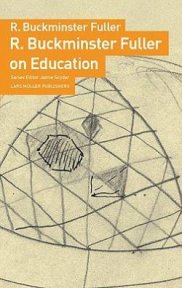 In 1962, Buckminster Fuller delivered a prophetic lecture at Southern Illinois University on the future of education aimed at “solving [educational] problems by design competence instead of by political reform.” It was eventually published as Education Automation: Comprehensive Learning for Emergent Humanity(public library) — a prescient vision for online education decades before the web as we know it, and half a century before the golden age of MOOCs, with elements of TED and Pandora mixed in.
In 1962, Buckminster Fuller delivered a prophetic lecture at Southern Illinois University on the future of education aimed at “solving [educational] problems by design competence instead of by political reform.” It was eventually published as Education Automation: Comprehensive Learning for Emergent Humanity(public library) — a prescient vision for online education decades before the web as we know it, and half a century before the golden age of MOOCs, with elements of TED and Pandora mixed in.
Fuller begins by tracing his own rocky start in traditional education and his eventual disillusionment with the establishment:
I am a New Englander, and I entered Harvard immaturely. I was too puerilely in love with a special, romantic, mythical Harvard of my own conjuring — an Olympian world of super athletes and alluring, grown-up, worldly heroes. I was the fifth generation of a direct line of fathers and their sons attending Harvard College. I arrived there in 1913 before World War I and found myself primarily involved in phases of Harvard that were completely irrelevant to Harvard’s educational system. For instance, because I had been quarterback on a preparatory school team whose quarterbacks before me had frequently become quarterbacks of the Harvard football team, I had hoped that I too might follow that precedent, but I broke my knee, and that ambition was frustrated.[...]Though I had entered Harvard with honor grades I obtained only “good” to “passing” marks in my college work, which I adolescently looked upon as a chore done only to earn the right to live in the Harvard community. But above all, I was confronted with social problems of clubs and so forth.[...]The problems they generated were solved by the great [Greek] House system that was inaugurated after World War I. My father died when I was quite young, and though my family was relatively poor I had come to Harvard from a preparatory school for quite well-to-do families. I soon saw that I wasn’t going to be included in the clubs as I might have been if I had been very wealthy or had a father looking out for me, for much of the clubs’ membership was prearranged by the clubs’ graduate committees. I was shockingly surprised by the looming situation. I hadn’t anticipated these social developments. I suddenly saw a class system existing in Harvard of which I had never dreamed. I was not aware up to that moment that there was a social class system and that there were different grades of citizens. My thoughts had been idealistically democratic. Some people had good luck and others bad, but not because they were not equal. I considered myself about to be ostracized or compassionately tolerated by the boys I had grown up with. … I became panicky about that disintegration of my idealistic Harvard world, went on a pretended “lark,” cut classes, and was “fired.”Out of college, I went to work and worked hard. In no time at all, reports went to Harvard that I was a good and able boy and that I really ought to go back to college; so Harvard took me back. However, I was now considered a social maverick, and I saw none of my old friends; it hurt too much. Again I cut classes, spent all my year’s allowance, and once more was “fired.” After my second “firing” I again worked very hard. If World War I hadn’t come along, I am sure the university would have taken me back again, and I am sure I would have been “fired” again. Each time I returned to Harvard I entered a world of gnawing apprehensions, not an educational institution, and that was the problem.
But Fuller, known for his public distaste for specialization, managed to get an education anyway, “in due and slow course” — one of “[his] own inquiring, experimenting, and self-disciplining.” In the thirty years since his “Harvard fiasco,” he was invited as a “lecturer, critic, or experimental seminarist” at 106 universities around the world, including nine times at Princeton, eight at MIT, and four at Cornell.
Then, forty-seven years after he had been expelled from Harvard, the university’s Dean Bundy, at the time one of JFK’s White House advisors, invited him to return to Harvard as the Charles Eliot Norton Professor of Poetry — a prestigious and unusual position created to emphasize the value of cross-pollinating ideas from different fields, lending to the concept of “poetry” the most expansive possible definition, also held by such luminaries as Umberto Eco, T.S. Eliot, E.E. Cummings, Jorge Luis Borges, Italo Calvino, and Leonard Bernstein. Fuller, who wasn’t a “poet” in the traditional sense despite his poetic scientific revision of The Lord’s Prayer, writes:
The chair was founded because its donor felt that the university needed to bring in individuals who on their own initiative have long undertaken objective realizations reflecting the wisdom harvested by the educators, which realizations might tend to regenerate the vigor of the university world. Harvard fills this professorship with men* who are artists, playwrights, authors, architects, and poets. The word poet in this professorship of poetry is a very general term for a person who puts things together in an era of great specialization wherein most people are differentiating or “taking” things apart. Demonstrated capability in the integration of ideas is the general qualification for this professorship.
(* Alas, this isn’t merely a reflection of the era’s gender-biased language, wherein “men” really means people. “Men” really does mean men here, as Harvard didn’t appoint a female Norton poet until 1979 — Helen Gardner — and as of this writing, has only had two other women hold the position since its inception in 1925 — Nadine Gordimer in 1994–1995 and Linda Nochlin in 2003–2004.)
Fuller considers what made him qualified for the position:
By my own rules, I may not profess any special preoccupation or capability. I am a random element. … There is nothing even mildly extraordinary about me except that I think I am durable and inquisitive in a comprehensive pattern. I have learned much; but I don’t know very much; but what I have learned, I have learned by trial and error. And I have great confidence in the meager store of wisdom that I have secured.
He admonishes that traditional education incentivizes and measures precisely the opposite — not the ability to be “inquisitive in a comprehensive pattern,” but to memorize with a narrow focus, which in turn stifles innovation:
I am convinced that humanity is characterized by extraordinary love for its new life and yet has been misinforming its new life to such an extent that the new life is continually at a greater disadvantage than it would be if abandoned in the wilderness by the parents.[…]The kind of examination procedure that our science foundations and other science leaders have developed is one in which they explore to discover whether [a] capable student is able to unlearn everything he has learned, because experience has shown that that is what he is going to have to do if he is to become a front-rank scientist. The frontiers of science are such that almost every morning many of our hypotheses of yesterday are found inadequate or in error. So great is the frontier acceleration that now in a year of such events much of yesterday’s conceptioning becomes obsolete.[…]I am quite confident that humanity is born with its total intellectual capability already on inventory and that human beings do not add anything to any other human being in the way of faculties and capacities. What usually happens in the educational process is that the faculties are dulled, overloaded, stuffed and paralyzed, so that by the time that most people are mature they have lost use of many of their innate capabilities. My long-time hope is that we may soon begin to realize what we are doing and may alter the “education” process in such a way as only to help the new life to demonstrate some of its very powerful innate capabilities.
Writing several years before the historic moon landing, Fuller argues that while such cosmic feats might be admirable aspirations for scientific, technological, and cultural progress, “nothing is going to be quite so surprising or abrupt in the forward history of man as the forward evolution in the educational processes.” He goes on to present a prescient vision for the future of mobile, time-shifted, tele-commuted education:
Today we are extraordinarily mobile… Comprehensively, the world is going from a Newtonian static norm to an Einsteinian all-motion norm. That is the biggest thing that is happening at this moment in history. We are becoming “quick” and the graveyards of the dead become progressively less logical. [Educational planners] will have to be serving the children of the mobile people who really, in a sense, don’t have a base…
And yet, noting that the world’s population is increasing in exponential rates and greater and greater numbers of people will need to be educated, he prefaces his vision for the future of education with a cautionary note about the importance of remaining rooted in history and connected with the great minds who have come before. (Massimo Vignelli’s famous contention that “a designer without a sense of history is worth nothing” is equally true, after all, of any field.) Fuller writes:
The new life needs to be inspired with the realization that it has all kinds of new advantages that have been gained through great dedications of unknown, unsung heroes of intellectual exploration and great intuitively faithful integrities of men groping in the dark. Unless the new life is highly appreciative of those who have gone before, it won’t be able to take effective advantage of its heritage. It will not be as regenerated and inspired as it might be if it appreciated the comprehensive love invested in that heritage.
He goes on to outline the technological advances that would give our world’s “new life” access to universal education, describing a paradigm that presages the concept of network-based online education, combined with the high production value of TED talks:
I have taken photographs of my grandchildren looking at television. Without consideration of the “value,” the actual concentration of a child on the message which is coming to him is fabulous. They really “latch on.” Given the chance to get accurate, logical, and lucid information at the time when they want and need to get it, they will go after it and inhibit it in a most effective manner. I am quite certain that we are soon going to begin to do the following: At our universities we will take the men who are the faculty leaders in research or in teaching. We are not going to ask them to give the same lectures over and over each year from their curriculum cards, finding themselves confronted with another roomful of people and asking themselves, “What was it I said last year?” This is a routine which deadens the faculty member. We are going to select, instead, the people who are authorities on various subjects — the men who are most respected by other men within their respective departments and fields. They will give their basic lecture course just once to a group of human beings, including both the experts in their own subject and bright children and adults without special training in their field. This lecture will be recorded. . . . They will make moving picture footage of the lecture as well as hi-fi tape recording. Then the professor and his faculty associates will listen to this recording time and again.“What you say is very good,” his associates may comment, “but we have heard you say it a little better at other times.” The professor then dubs in a better statement. Thus begins complete reworking of the tape, cleaned up, and cleaned up some more, as in the moving picture cutting, and new illustrative “footage” will be added on. The whole of a university department will work on improving the message and conceptioning of a picture for many months, sometimes for years. The graduate students who want to be present in the university and who also qualify to be with the men who have great powers and intellectual capability together with the faculty may spend a year getting a documentary ready. They will not even depend upon the diction of the original lecturer, because the diction of that person may be very inadequate to his really fundamental conceptioning and information, which should be superb. His knowledge may be very great, but he may be a poor lecturer because of poor speaking habits or false teeth. Another voice will take over the task of getting his exact words across. Others will gradually process the tape and moving picture footage, using communications specialists, psychologists, etc.For instance, I am quite certain that some day we will take a subject such as Einstein’s Theory of Relativity, and with the “Einstein” of the subject and his colleagues working on it for a year, we will finally get it reduced down to what is “net” in the subject and enthusiastically approved by the “Einstein” who gave the original lecture. What is net will become communicated so well that any child can turn on a documentary device, a TV, and get the Einstein lucidity of thinking and get it quickly and firmly. I am quite sure that we are going to get research and development laboratories of education where the faculty will become producers of extraordinary moving-picture documentaries. That is going to be the big, new educational trend.
Noting that these “documentaries” will be distributed in various ways, Fuller even presages the feedback loop of content recommendation algorithms, envisioning a sort Pandora of education:
There is a direct, fixed, wireless connection, an actual direct linkage to individuals; and it works in both directions. Therefore, the receiving individual can beam back, “I don’t like it.” He may and can say “yes” or “no.” This “yes” or “no” is the basis of a binary mathematical system, and immediately brings in the “language” of the modern electronic computers. With two-way TV, constant referendum of democracy will be manifest, and democracy will become the most practical form of industrial and space-age government by all people, for all people.It will be possible not only for an individual to say, “I don’t like it,” on his two-way TV but he can also beam-dial (without having to know mathematics), “I want number so and so.” It is also possible with this kind of two-way TV linkage with individuals’ homes to send out many different programs simultaneously; in fact, as many as there are two-way beamed-up receiving sets and programs. It would be possible to have large central storages of documentaries — great libraries. A child could call for a special program information locally over the TV set.
While Fuller acknowledges the “general baby-sitting function” of traditional schools and the value of these social experiences for kids, he argues that this new model of long-distance education also provides the additional benefit of greater capacity for solitary contemplation of materials. He points to Einstein, who he had met a few years earlier, to illustrate his point:
Einstein, when he wanted to study, didn’t sit in the middle of a school room. That is probably the poorest place he could have gone to study. When an individual is really thinking, he is tremendously isolated. He may manage to isolate himself in Grand Central Station, but it is despite the environment rather than because of it. The place to study is not in a school room.
This, Fuller argues, wouldn’t threaten traditional universities but, rather, fortify them and amplify their power by allowing education to serve a broader purpose in human culture — not mere memorization, but a lens on how to live. He concludes optimistically:
Education will then be concerned primarily with exploring to discover not only more about the universe and its history but about what the universe is trying to do, about why man is part of it, and about how can, and may man best function in universal evolution.[…]The universities are going to be wonderful places. Scholars will stay there for a long, long time — the rest of their lives — while they are developing more and more knowledge about the whole experience of man. All men will be going around the world in due process as everyday routine search and exploration, and the world experiencing patterning will be everywhere — all students from everywhere all over the world. That is all part of the new pattern that is rushing upon us.
Fuller goes into his prescient vision in greater detail in the rest of Education Automation, including some timeless commentary on the complex politics of education. Complement it with his scientific revision of The Lord’s Prayer and his case against the specialization of knowledge. For a contemporary alternative to the path of traditional education, see Kio Stark’s indispensable Don’t Go Back to School.

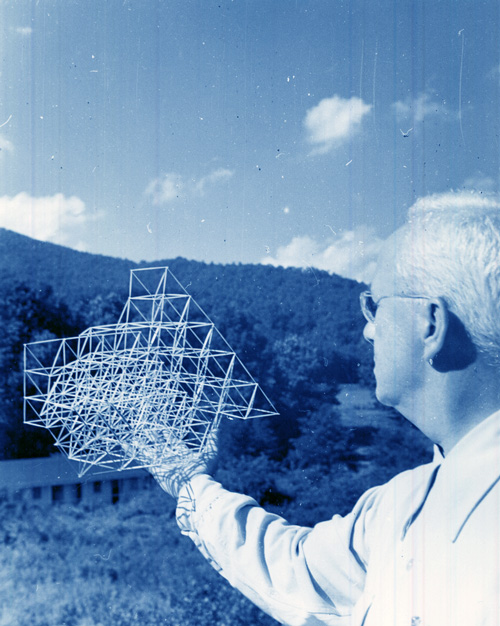
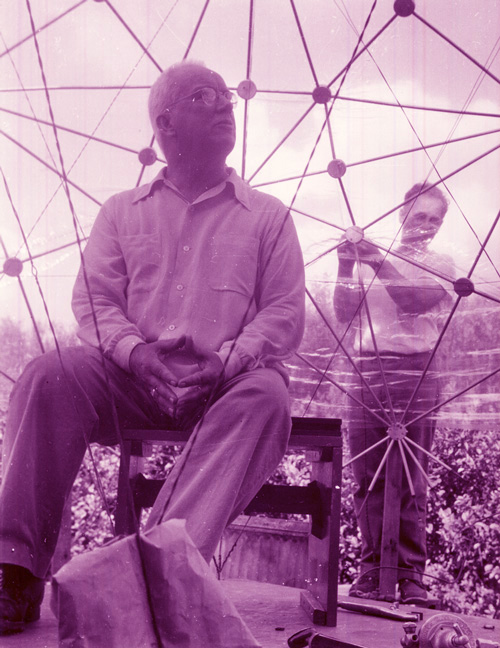
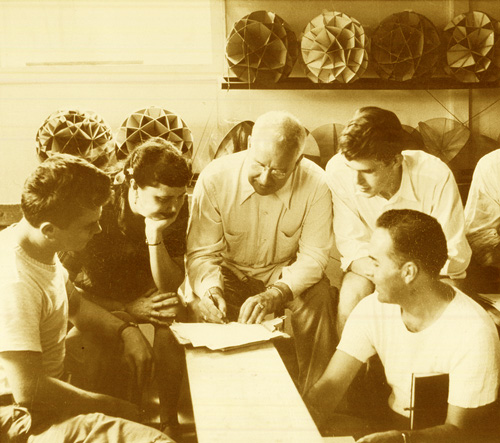
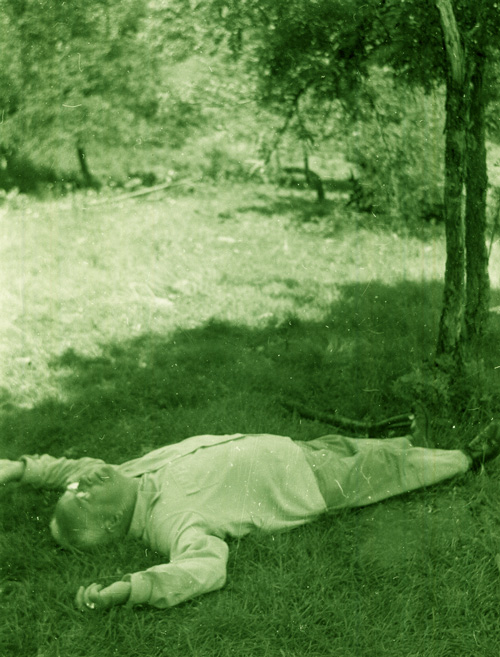
No comments:
Post a Comment